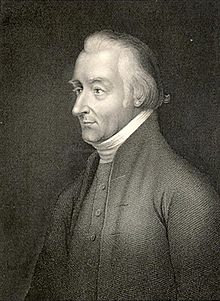Lindley Murray (grammarian)
Lindley Murray (born June 7, 1745 at Harper Tavern , Province of Pennsylvania , United States , † January 16, 1826 in Holgate near York , United Kingdom ) was an American lawyer and businessman who became famous as a grammarian . His English Grammar was after Spelling Book of Noah Webster the best-selling English -sprachigen book in the first half of the 19th century. Until the 1960s, English school grammars referred to this work.
Life
Lindley Murray was the son of Quaker and businessman Robert Murray and his wife Mary. Her house was on a hill in Manhattan where Park Avenue and 36th Street now intersect. The area is still called Murray Hill to this day . Lindley Murray worked as a lawyer and businessman. Around 1784 he retired to Holgate near York in England . According to some sources, the reason for this was that he was a loyalist , other sources cite his poor health. For the last 16 years of his life, Murray suffered from depression and never left the house.
The grammar
Before Lindley Murray dealt with the subject, the main grammar came from the Oxford poetics professor and later London Bishop Robert Lowth . His short Introduction to English Grammar , published anonymously, appeared in 1762. Both Lowth and later Murray took a prescriptive approach and wanted to set norms with their grammars. The first sentence of his grammar read: English grammar is the art of speaking and writing the English language with correctness ( or decency). ("English grammar is the art of speaking and writing the English language with propriety") . Murray took much of his material from Lowth.
In his retirement, Murray was asked to write teaching materials for a girls' school. This resulted in the English Grammar, adapted to the different classes of learners: With an Appendix, containing Rules and Observations for Promoting Perspicuity in Speaking and Writing , which appeared in 1795. The work experienced a phenomenal success with 200 editions by 1850 alone and 20 million copies sold. It was even more popular in the United States than in the United Kingdom and has been translated into numerous other languages as well. The fact that in Murray's time there was no copyright that would have protected the rights of an author contributed to the success . In the early 19th century "grammar" and Murray became synonyms in the English-speaking world , and his popularity is also proven by the fact that writers like Charles Dickens or satirical magazines like Punch made fun of him. In articles on grammar, Murray's English Grammar was always the benchmark, whether it was rejected or defended.
Murray was a close observer of the English language, and much of his grammar, with some changes in terminology, could still appear in a modern descriptive grammar today.
The concise rules, which are mostly undisputed even today, are followed by long comments in small print, which occasionally provoked ridicule even during Murray's lifetime. For example, Murray argued that after child one should not use the pronoun who because children are not yet rational beings. Murray rejected the repeated denial from, even though they are already in Old English can prove of Shakespeare has been used and also in his time in the vernacular was common for emphasis. Murray was so convinced of the value of his grammatical norms that he even condemned the use of will and shall in the King James Bible . Ultimately, this led to the language as used by the majority of English speakers being branded as "incorrect". Many other rules, which Murray had originally only thought of as a style recommendation, became norms in school lessons from which students were not allowed to deviate. Murray had recommended not ending a sentence with an adverb or a preposition. Students were then chalked up as a grammatical error. When Murray established his norms, he argued either with aesthetic criteria - one construction is more elegant or more harmonious than the other - with clarity or the precision of a construction. On closer inspection, however, the variant he rejected often does the same.
Murray's grammar had the greatest impact of any book in breaking the English language into a standard language and non-standard varieties, while previously forming a continuum.
In addition to his grammar, he wrote other school books, of which the English Reader was the most popular.
literature
- Charles Monaghan: The Murrays of Murray Hill . Urban History Press, Brooklyn, NY, 1998.
- Claus Bernet : Lindley Murray. In: Biographisch-Bibliographisches Kirchenlexikon (BBKL). Volume 31, Bautz, Nordhausen 2010, ISBN 978-3-88309-544-8 , Sp. 943-958.
Web links
- Literature by and about Lindley Murray in the catalog of the German National Library
- The English Reader in an 1827 US edition in the University of Pittsburgh Digital Library
- Abridgment of Murray's English grammar in an 1819 US edition in the International Children's Digital Library
| personal data | |
|---|---|
| SURNAME | Murray, Lindley |
| BRIEF DESCRIPTION | American lawyer, businessman, and grammarian |
| DATE OF BIRTH | June 7, 1745 |
| PLACE OF BIRTH | at Harper Tavern , Pennsylvania , United States |
| DATE OF DEATH | January 16, 1826 |
| Place of death | Holgate near York , United Kingdom |
